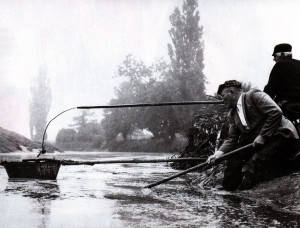
The Somerset Levels were once full of eels and they were an important part of the diet.
Phyllis Jones from Burrowbridge was born in 1918 near the River Parrett…
“The elver time was great time along the River Parrett. They used to get Mother to go into Hoopers of Bridgwater to get the old canvas net and she used to sew it onto this big net affair with a long handle. And they would go down along in the spring; they come up with the tides, but if it was cold they wouldn’t.
We used to bring them in and they were all frothing and all scooping about, and they put them in the bucket and they poured boiling water on to scald them.
They would be grey when you picked them up, but when you scalded them, they would be white.
Then you washed them four or five times to get all the froth out of them, and then you put them in a little bit of salt water and leave them all night. You washed them again and then you drained them and then you put them in the frying pan with a drop of water and just cooked them lightly. You drain off the water and then you put a little bit of fat and beat up three or four eggs and cook them all in, and then you put a plate on top and let them brown like bubble and squeak and they are gorgeous. You cut them our like a cake. We’d eat that at supper time… or else I’ve known Mother cook them at breakfast if the men wanted them.”








